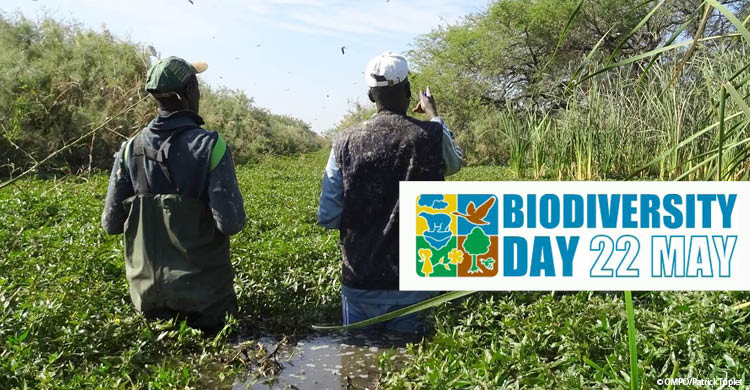International Day for Biological Diversity 2022

The theme of this year’s International Day for Biological Diversity is: “Building a shared future for all.” © RESOURC PROJECT / OMPO Patrick Triplet
Statement by Jacques Trouvilliez, Executive Secretary
of the Agreement on the Conservation of African-Eurasian Migratory Waterbirds (AEWA)
on the International Day for Biological Diversity
Human beings are part of the web of life. We are part of what we have come to call biodiversity – the wide variety of animals, plants, fungi, bacteria, and other organisms that make up our natural world. And yet, in the relatively short time our species has existed, we have had a significant and unfortunately predominantly negative impact on the planet’s climate, its species, and ecosystems. As part of this web of life, human beings have also been benefitting from the huge number of services that nature provides and the erosion of these will have an increasingly devastating effect on our lives.
“Building a shared future for all life” is this year’s theme for the International Day for Biological Diversity (IDB) which will be highlighted around the world on 22 May. The theme is a poignant reminder that we need to keep, and where it has been lost - restore and strengthen - this link with nature and re-double our efforts to ensure the sustainability of all our actions, including the way we use and harvest from nature.
The African-Eurasian Migratory Waterbird Agreement (AEWA) and its partners in the RESOURCE Project are working with local communities in the Sahel region to ensure that waterbird harvests are sustainable and can also benefit people as a source of food and income in a sustainable way for generations to come. The FAO-led project aims to improve the sustainable use of waterbirds in the wetlands of Egypt, Mali, Senegal, Sudan and Chad and is a good example of how we can work together, across borders to try to build a shared, sustainable future for people and waterbirds alike.
As they cross countries and continents, migratory waterbirds are in many ways ambassadors for biodiversity. They are the face of nature in the sky and the visitors to our wetlands, coastlines and fields that help us reconnect with nature. As the RESOURCE Project and our own World Migratory Bird Day campaign are showing, migratory birds can also help communicate the importance of nature and what actions are needed to address the wider biodiversity crisis.
In other words, “Building a shared future for all life” echoes the same “cooperative spirit” upon which AEWA and all other international environmental treaties were founded: the idea that we are all in the same boat when it comes to the environment and that countries must work together to protect and restore our shared natural resources.
As the Executive Secretary of the Agreement on the Conservation of African-Eurasian Migratory Waterbirds (AEWA), I would like to reassure you that AEWA stands ready to continue to play its important part in tackling these global challenges by promoting international cooperation and concerted actions for the benefit of migratory waterbirds and people across the African-Eurasian Flyway.
Last updated on 30 June 2022


